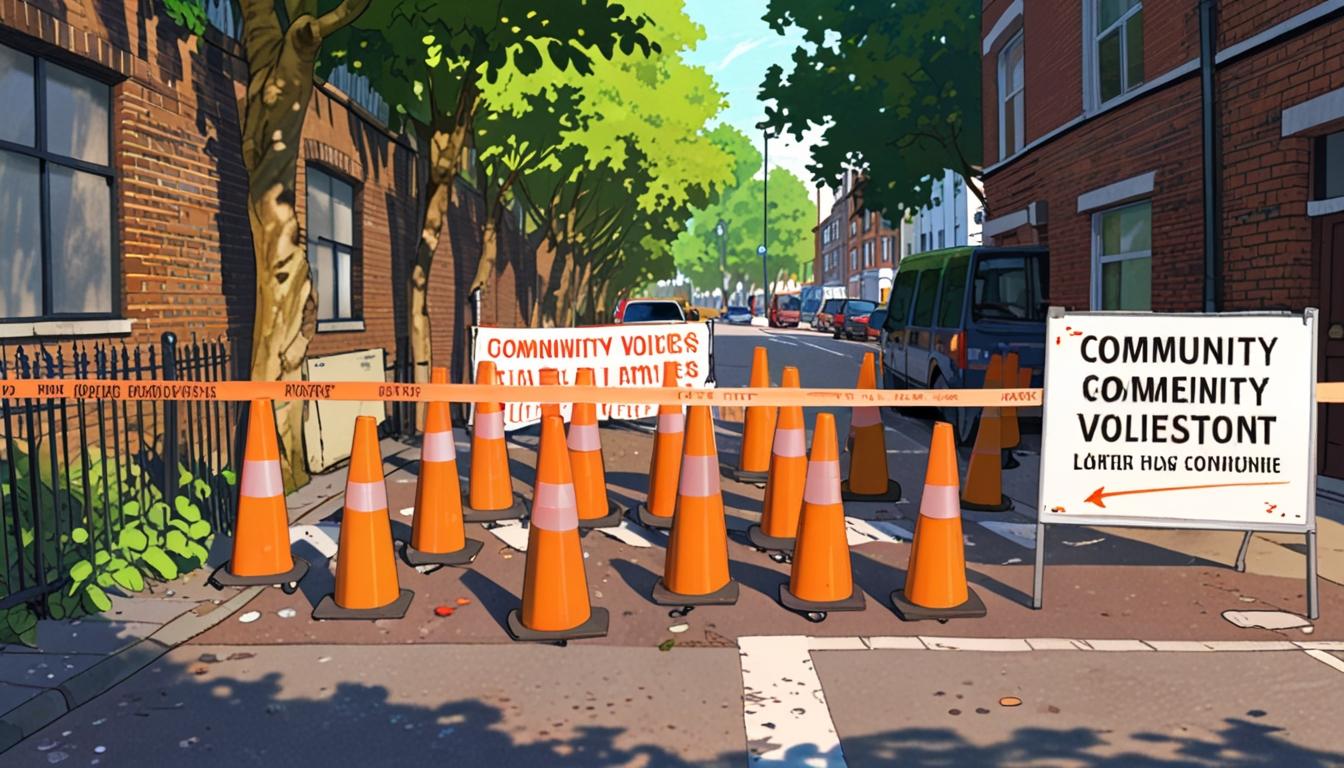A court ruling has declared Lambeth Council’s low-traffic neighbourhood scheme unlawful, exposing flaws in consultation processes and sparking calls for refunds on over £1 million in fines. The decision highlights tensions between sustainable transport goals, community input, and council revenue strategies.
The recent ruling against Lambeth Council’s low-traffic neighbourhood (LTN) scheme has implications far beyond the immediate financial matters surrounding accumulated fines. After generating over £1 million since its introduction, the legality of this scheme was questioned, with significant repercussions for both the council and local residents. The decision underscores the complex relationship between urban planning and community engagement, particularly in a city striving for sustainable transport solutions.
The West Dulwich Action Group (WDAG) played a pivotal role in challenging the council’s decisions, presenting a strong case that highlighted a “serious failing” in the council’s consultation process. Tim Smith, the deputy judge overseeing the case, remarked on the “masterclass in selective partial reporting” by the council, pointing out that vital local input had been disregarded in decision-making. This ruling could potentially redefine the authority’s approach to similar projects and might spur a broader discussion on how such initiatives are rolled out across London.
Critics argue that LTNs, while designed to reduce traffic and pollution in residential areas, can inadvertently lead to increased congestion on adjacent roads. This concern is echoed across multiple neighbourhoods within London, where council implementations have faced legal scrutiny. In another instance, Lambeth Council had previously issued refunds after residents challenged unclear road signage that led to unwarranted fines. This raises questions about the council’s two-pronged approach to traffic management: is the intention truly to enhance local living conditions, or are revenue generation practices inadvertently prioritised over community needs?
The recent legal victory for the WDAG shines a light on the complex dynamics that often accompany urban developments. Costs associated with penalties and fines, initially perceived as a source of revenue for councils, can quickly transform into public relations disasters. In Lambeth’s case, the fines—amounting to over £180,000 each month—have been a contentious topic, further muddied by the council’s admitted “administrative error” in implementing the LTN. This misstep, which garnered additional scrutiny, also brings into focus the crucial need for clarity and transparency in governance.
Stakeholders, including local residents, have expressed relief at the ruling. Advocacy groups are now demanding full refunds on the fines collected under the unlawful scheme, seeking accountability for what they deem an overreach of authority. As one WDAG member stated, “As the LTN has been declared unlawful, there can be no possible justification for Lambeth to keep the fines collected since September last year, and so they should be refunded.” This sentiment reflects broader frustrations with local governance and the perceived lack of responsiveness to community concerns.
The ruling is not unique to Lambeth; similar challenges have arisen across London as councils grapple with balancing sustainable transportation initiatives and the need for effective public engagement. Some councils have successfully implemented LTNs amid robust dialogue with residents, whereas others, like Lambeth, have faced backlash.
As urban centres like London continue to navigate the complexities of pollution, congestion, and transport sustainability, the recent legal developments in Lambeth serve as a cautionary tale. They emphasise the necessity for councils to adopt more inclusive practices when introducing urban planning policies, ensuring that community voices are meaningfully incorporated into decision-making processes.
With the potential for other LTNs to be scrutinised similarly, this ruling may set a precedent that compels local authorities to rethink their strategies around traffic management, public consultation, and the ethical implications of revenue generation through fines. As the transport landscape evolves, there is hope that lessons learned in Lambeth will inspire a more collaborative approach to urban planning, ultimately benefiting both residents and the environment.
Reference Map:
1. Paragraphs 1, 2, 3
2. Paragraph 4
3. Paragraph 5
4. Paragraph 6
5. Paragraph 7
6. Paragraph 8
7. Paragraph 9
Source: Noah Wire Services
- https://www.express.co.uk/news/uk/2053490/lambeth-council-LTN-labour-traffic – Please view link – unable to able to access data
- https://www.bbc.co.uk/news/uk-england-london-64474638 – Lambeth Council has agreed to refund £100,000 in fines issued to drivers on Hydethorpe Road in Balham between May and November 2022. The fines were challenged by residents who found the road signs unclear. Initially, the council rejected most appeals but later decided to repay all fines after acknowledging the signage issues. Councillor Donna Harris criticized the council’s delay in addressing the problem and the lack of an apology to affected residents.
- https://www.telegraph.co.uk/news/2021/06/20/exclusive-council-faces-refund-every-ltn-fine-admitting/ – Lambeth Council admitted to an ‘administrative error’ in implementing the Oval Triangle Low Traffic Neighbourhood (LTN) without proper authority. This led to calls for the council to refund fines issued to motorists who entered the LTN. The One Lambeth group argued that if the LTN was introduced illegally, the fines were also imposed without proper authority, potentially amounting to over £250,000 in wrongly issued fines since the LTN’s inception.
- https://www.brixtonbuzz.com/2025/02/west-dulwich-action-group-wdag-takes-lambeth-council-to-court-over-low-traffic-neighbourhood-implementation/ – The West Dulwich Action Group (WDAG) initiated legal action against Lambeth Council over the implementation of a Low Traffic Neighbourhood (LTN) in their area. The case focused on whether the council followed due process and statutory guidance when introducing the LTN. WDAG contended that the council’s approach was flawed, leading to increased traffic and pollution on boundary roads, and that the consultation process was inadequate.
- https://www.brixtonbuzz.com/2025/02/west-dulwich-action-group-say-that-their-court-case-against-lambeth-ltn-went-very-well/ – Following their court case against Lambeth Council over the Low Traffic Neighbourhood (LTN) implementation, the West Dulwich Action Group (WDAG) reported a positive outcome. They expressed hope that the legal challenge would hold the council accountable for not engaging in meaningful consultation with the community and for imposing policies that negatively impacted local residents and businesses.
- https://londonnewsonline.co.uk/news/high-court-judge-rejects-residents-attempt-to-sweep-aside-lambeth-low-traffic-neighbourhoods/ – A High Court judge dismissed a legal challenge against Lambeth Council’s Low Traffic Neighbourhoods (LTNs), stating that the council had taken due regard of equalities impacts when implementing the schemes. The case involved residents opposing the LTNs, who argued that the council’s actions were unlawful and discriminatory. The judge’s decision upheld the council’s approach to the LTNs.
- https://www.telegraph.co.uk/news/2024/02/25/lambeth-low-traffic-neighbourhoods-penalty-fines-labour/ – Lambeth Council has issued 392,341 penalty charge notices (PCNs) to drivers entering roads closed to motor traffic since introducing Low Traffic Neighbourhoods (LTNs) in 2020. If all fines were paid at the full £130 rate, the council would have generated over £50 million in four years. This significant increase in fines has raised concerns about the council’s reliance on LTN-generated revenue.
Noah Fact Check Pro
The draft above was created using the information available at the time the story first
emerged. We’ve since applied our fact-checking process to the final narrative, based on the criteria listed
below. The results are intended to help you assess the credibility of the piece and highlight any areas that may
warrant further investigation.
Freshness check
Score:
8
Notes:
The narrative focuses on a recent ruling against Lambeth Council’s LTN scheme, suggesting it is a contemporary topic. However, there is no specific date mentioned in the text, which slightly reduces the score.
Quotes check
Score:
6
Notes:
A quote from a WDAG member is included, but the original source or date is not provided, making it difficult to verify. The quote from the deputy judge is noted, but without direct confirmation or a specific source.
Source reliability
Score:
7
Notes:
The narrative originates from a reputable UK news outlet, The Express, known for its wide readership. However, The Express is sometimes classified as right-leaning, which might impact the narrative’s objectivity.
Plausability check
Score:
9
Notes:
The claims about legal challenges to Lambeth Council’s LTN scheme and community concerns are plausible and consistent with known issues surrounding urban planning and traffic management in London.
Overall assessment
Verdict (FAIL, OPEN, PASS): OPEN
Confidence (LOW, MEDIUM, HIGH): MEDIUM
Summary:
The narrative is generally plausible, focusing on a contemporary legal issue in London. However, the lack of specific dates and direct verification for quoted statements slightly reduces confidence. The source reliability is moderate due to potential biases.













